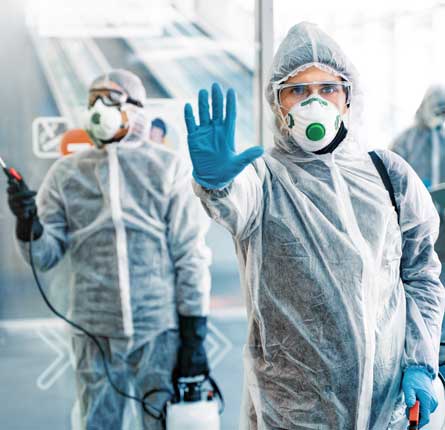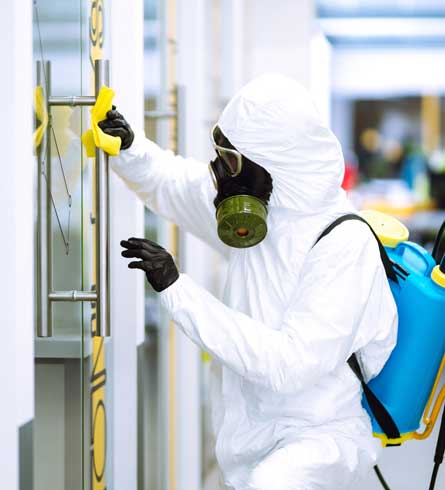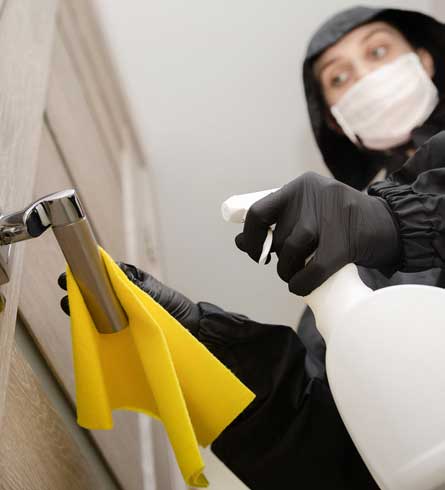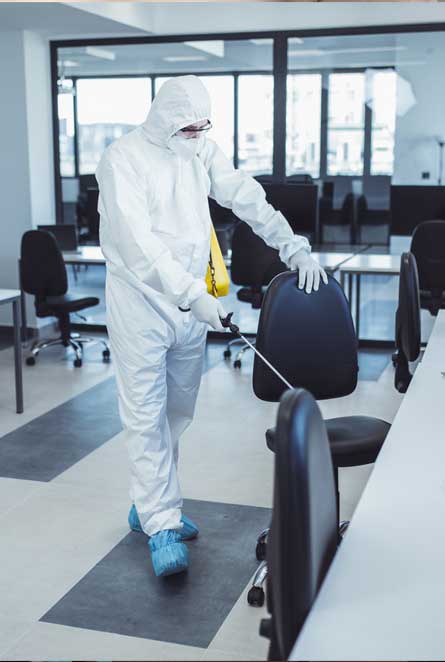
Are afraid to have anyone COVID positive in your site?
Have you had anyone in your workplace tested positive?
Would you like to lower your chances of getting anyone Coronavirus infected?
Are you struggling to have your daily Commercial maintenance disinfecting?
You are in the right place and we can help you too
Everyone is afraid of COVID, and doesn’t want to be infected.
Is this creating more stress, anxiety and uncertainty in your workplace?
How about having a systematic program to make everyone safe in your office. Would you like that?
As there is a lot of confusion out there, we are going to take a moment to clarify, explain and guide you as much as we can.
Disclaimer:
All this copy is made to the best of our ability and we take NO responsibility for how you use this information. Before taking any decision, please consult your field experts.

The easiest answer would be:
Cleaning is done using a detergent
Disinfecting is done by using a sanitiser
Are you looking for someone to take care of your office disinfection daily?
Inevitably, then the following is: which one comes first and why? It’s simple: We normally clean the surfaces with a detergent and then we sanitise them with a sanitiser after. If the surface is not clean, the sanitise will not be effective if the surface is dirty. It doesn’t work. Most people are now afraid of this invisible enemy called Coronavirus and don’t know how to protect themselves and their loved one from it. In this page, we are going to propose a few solutions

You can maintain your home free of COVID if you do these few things:
- Keep yourself informed on what’s happening in your neighbourhood
- Have a routine hygiene to keep your home clean at all times and as much as possible, and target the high touch areas.
- Don’t watch too much news. Most of them are negative and they can lead to depression, bad mood and anxiety
- COVID does not discriminate: we are all treated equally and NO one is safe. Anyone can get infected by anything, anywhere and at any time.
- Don’t go with your shoes inside your home
- Disinfect your hands as soon as you enter your home and before hugging anyone
- Disinfect anything you bring into your home
- Wash your hands frequently with soapy water or detergent
- Have a routine to disinfect the high touch areas as often as you can
- Avoid touching your face and nose if you are not sure that your hands are clean
- Any common-sense action that can prevent the spread of the virus
- You can do all this cleaning and sanitisation yourself or delegate it to a trusted cleaner
- Always wear gloves when clean, disinfecting or sanitising any area of your home.

- Have in place a regular cleaning service combined with a sanitisation plan to match the number of clients, workers, visitors the business receives every day. The sanitisation plan has to target mainly all the high touch and traffic areas.
- Have a temperature check before entering the workplace, which will not detect all case of Covid-19 because infected people may not have any high temperature during the incubation or before showing other symptoms
- Thermal screening, as part of a prevention measure plan, could help you to control the Covid-19 spread in your workplace.
- Stay home if unwell policy: if someone is not feeling 100% well, they need to stay home and report it. This is a preventative action to avoid spreading the virus in case of COVID infection
- Wear masks any time you are not able to maintain the social distance for any reason. It lowers the risks of getting infected.
- Increased ventilation (natural or artificial), without re-circulating the air, is recommended by the WHO
- Mental health support should be available and encouraged by workers. Treat it as an act of courage and not as cowardness or weakness
- Instruct all workers to clean and sanitise all their personal belongings such as mobiles, glasses, keys, agendas, iPads, computers … etc
- Use disinfectant of at least 70% of alcohol
- Use different disposable gloves for different areas of the workplace to avoid cross-contamination
- Use the right PPE (personal protective equipment) required for the job. We can never be too prudent.
If you get a worker, or trade, or visitor, or customer positive to COVID, it will cost you a lot of money, headache, time, stress, loss of business, and a few days with closed business. Consequently, it will affect your mood, cash flow, increase your stress level and it will inconvenience everyone around you
How to avoid or minimise the chances of getting anyone testing positive?
NOT easy, but possible. You can start by putting a COVID plan in place and some regular good practices such as:
- Temperature test before the entrance. NO one with high temperature goes in your building. This can be done with the help of a machine or putting a staff member at the entrance.
- Any employee who is not feeling 100%, HAS to let you know and above all to STAY HOME.
- All sick or not feeling very well employees need to have the option to work from home (if possible), to help them lose their paycheque and to continue their doing their work from home to benefit your company.
- NO one goes in your premises without a mask. You need to give the example by putting one on yourself.
- Structure your office space and workplace to maintain the social distance as much as possible
- Limit the number of people visiting your office to the most important and urgent matters.
- Encourage phone calls, video calls, and zoom meetings whenever possible
- Limit the people coming to the office as much as possible and if is it not possible, encourage more flexible working hours.
- Start thinking about this “new normal”, accept it and start working within it. Do not fight it and create a new culture to promote it for the wellbeing of everyone. Learn to adapt to it
- Encourage hand sanitising and have sanitisers on each desk, in the elevators, in the lobby or waiting area, at the entrance, in the bathrooms, in the common areas … and make them very visible and easy to use. The automatic sanitisers work best.
- Encourage to have a max number of people per space and enforce it.
- If you have a warehouse, fogging once a week is highly recommended to lower the virus and bacteria growth.
- Have a minimum of one daily disinfecting clean. This is an addition to your daily cleaning service. Your regular cleaner can do it for you at the end of their clean using an Australian TGA approved commercial-grade disinfectant like Netbiokem
- If you have a lot of people visiting your site, you need to organise a scheduled 1hr to 4hrs disinfection of the high touch areas.
- These small good practices could save you and the people around from infecting each other and will lower your chances of having a COVID positive case in your site.
If you need help with a COVID deep clean or daily maintenance disinfection or fogging disinfection for your commercial property, please call us to give you an estimate over the phone. we are helping many employers as you work safely
With us, you will be in very good hands. Call today
A: Yes, you can. They are efficient, save time, effort and money. Just make sure you read the careful, label
Viruses, in general, a resistant to low temperatures and can survive long if frozen.
- Commercial Covid Disinfection Brooklyn
- Commercial Covid Disinfection Kingsville
- Commercial Covid Disinfection Maidstone
- Commercial Covid Disinfection Tottenham
- Commercial Covid Disinfection West Footscray
- Commercial Covid Disinfection Albanvale
- Commercial Covid Disinfection Kealba
- Commercial Covid Disinfection Kings Park
- Commercial Covid Disinfection St Albans
- Commercial Covid Disinfection Ascot Vale
- Commercial Covid Disinfection Highpoint City
- Commercial Covid Disinfection Maribyrnong
- Commercial Covid Disinfection Travancore
- Commercial Covid Disinfection Keilor Downs
- Commercial Covid Disinfection Keilor Lodge
- Commercial Covid Disinfection Taylors Lakes
- Commercial Covid Disinfection Watergardens
- Commercial Covid Disinfection Airport West
- Commercial Covid Disinfection Keilor Park
- Commercial Covid Disinfection Niddrie
- Commercial Covid Disinfection Glenroy
- Commercial Covid Disinfection Hadfield
- Commercial Covid Disinfection Oak Park
- Commercial Covid Disinfection Broadmeadows
- Commercial Covid Disinfection Dallas
- Commercial Covid Disinfection Jacana
- Commercial Covid Disinfection Brunswick South
- Commercial Covid Disinfection Brunswick West
- Commercial Covid Disinfection Moonee Vale
- Commercial Covid Disinfection Moreland West
- Commercial Covid Disinfection Fawkner
- Commercial Covid Disinfection Craigieburn
- Commercial Covid Disinfection Donnybrook
- Commercial Covid Disinfection Mickelham
- Commercial Covid Disinfection Roxburgh Park
- Commercial Covid Disinfection Kalkallo
- Commercial Covid Disinfection Sunshine
- Commercial Covid Disinfection Melton
- Commercial Covid Disinfection Mitchell Shire
- Commercial Covid Disinfection Yarra Ranges
- Commercial Covid Disinfection Cardinia
- Commercial Covid Disinfection Sunbury
- Commercial Covid Disinfection Mernda
- Commercial Covid Disinfection Whittlesea
- Commercial Covid Disinfection Strathewen
- Commercial Covid Disinfection Whyndham
- Commercial Covid Disinfection Casey
- Commercial Covid Disinfection Moreland
- Commercial Covid Disinfection Hume
- Commercial Covid Disinfection Darebin
- Commercial Covid Disinfection Hobsons Bay
- Commercial Covid Disinfection Altona Meadows
- Commercial Covid Disinfection Laverton north
- Commercial Covid Disinfection Laverton
- Commercial Covid Disinfection Hoppers Crossing
- Commercial Covid Disinfection Deer Park
- Commercial Covid Disinfection Keilor
- Commercial Covid Disinfection Altona
- Commercial Covid Disinfection Werribee
- Commercial Covid Disinfection Wyndham Vale
- Commercial Covid Disinfection Tarneit


 Email Us
Email Us Whatsapp
Whatsapp

